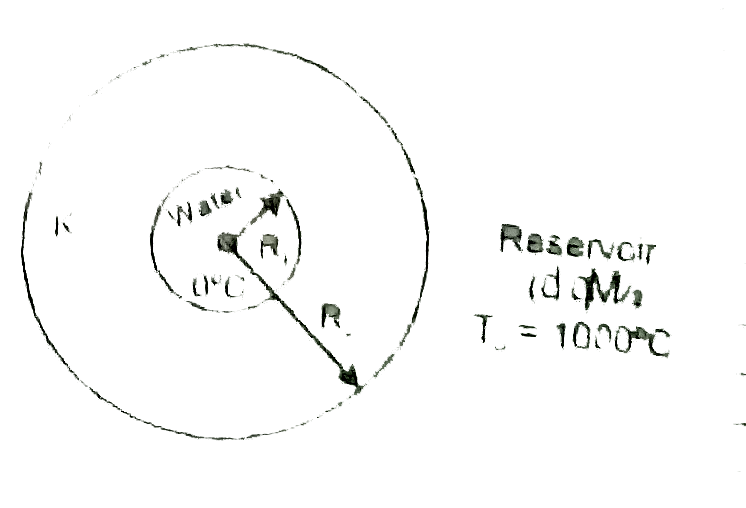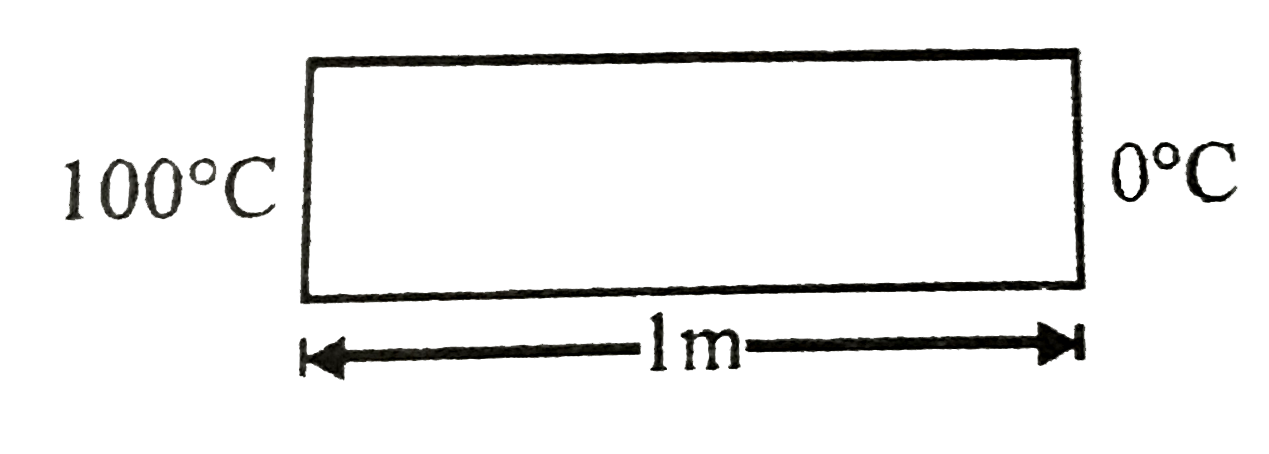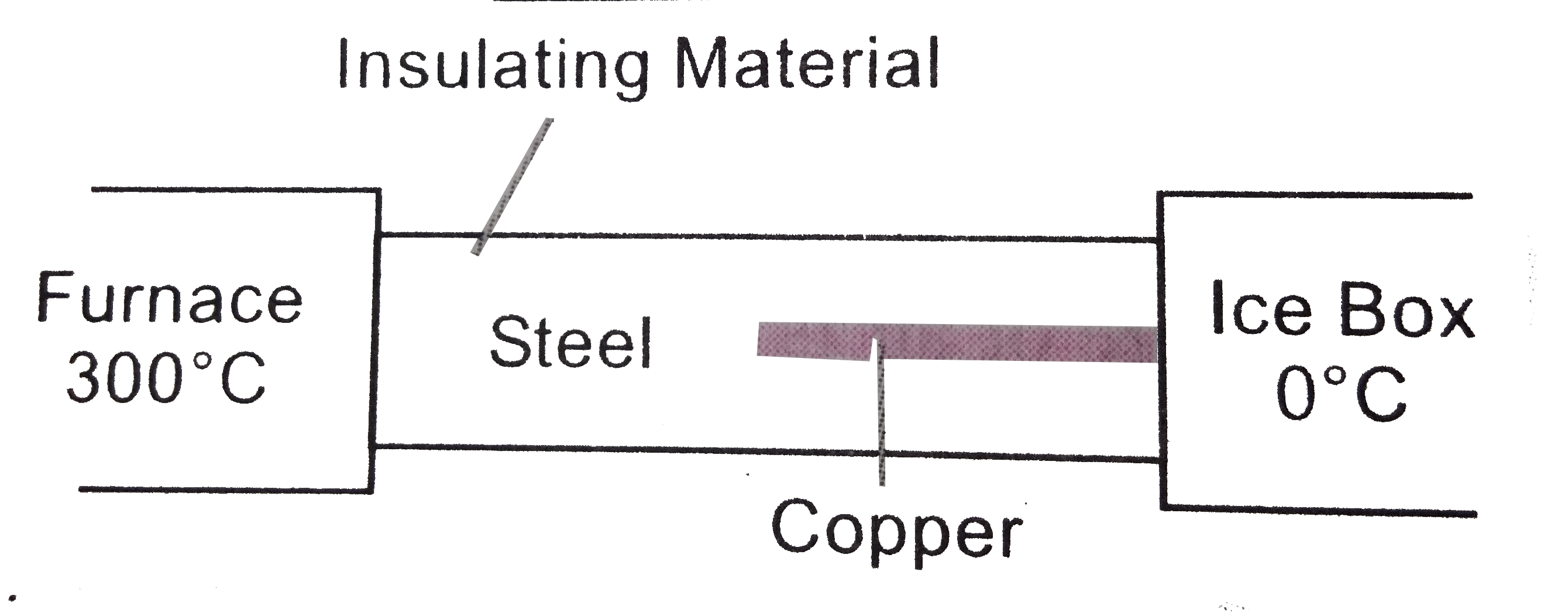A heat source at T = 103 K is connected to another heat reservoir at T = 102 K by a copper slab which is 1 m thick. Given that the thermal conductivity of copper is 0.1 WK−1m−1, the energy flux through it in steady state is :
200Wm−2
90Wm−2
65Wm−2
120Wm−2
The correct Answer is:B
Step by step video & text solution for A heat source at T = 10^(3) K is connected to another heat reservoir at T = 10^(2) K by a copper slab which is 1 m thick. Given that the thermal conductivity of copper is 0.1 WK^(-1)m^(-1), the energy flux through it in steady state is : by Physics experts to help you in doubts & scoring excellent marks in Class 11 exams.
Updated on:21/07/2023Similar Questions
A hollow spherical conducting sheel of inner radius R1=0.25m and outer radius R2=0.50m is placed inside a heat reservoir of temperature T0=1000∘C. The shell is initially filled with water at 0∘C. The thermal conductivity of the material is k=1024πW/m−K and its heat capacity is negligible. The time required to raise the temperature of water to 100∘Cis1100ln.109sec. Find K. Take specific heat of water s=4.2kJ/kg.∘C, density of water dw=1000kg/m3π=227

View SolutionSteam at 373 K is passed through a tube of radius 10cm and length10cm and length 2m. The thickness of the tube is 5mm and thermal conductivity of the material is390Wm−1K−1, calculate the heat lost per second. The outside temperature is 0∘C.
View Solution
Knowledge Check
A heat source at T = 500 k is connected to another heat reservoir at t = 100 k by a copper slab which is 1 m long. Given that the thermal conductivity of copper is 0.1Wk−1m−1 , the energy flux through it in the steady state is:
A4000Wm−2B400Wm−2C40Wm−2D4Wm−2A rod of 1m length and area of cross-section 1cm2 is connected across two heat reservoirs at temperature 100∘C and 0∘C as shown. The heat flow per second through the rod in steady state will be [Thermal conductivity of material of rod =0.09kilocalm−1s−1('∘C)]
 A9×10−4kilocal/secB9kilocal/secC0.09kilocal/secD9×10−6kilocal/sec
A9×10−4kilocal/secB9kilocal/secC0.09kilocal/secD9×10−6kilocal/sec1.56×105J of heat is conducted through is 2m2 wall of 12 cm thick in one hour. Temperature difference between the two sides of the wall is 20∘C. The thermal conductivity of the material of the wall is (in Wm−1K−1)
A0.11B0.13C0.15D1.2
A heater of resistance 20 Ω is used to heat a room at 10∘C and is connected to 220 V mains. The temperature is uniform inside the room and heat is transmitted outside the room through a glass window of area 1.2m2 and thickness 0.1 cm. If T∘C is the temperature outside and thermal conductivity of glass is0.2cals−1m−1∘C−1 , then find the value of 10T - 75 close to nearest integer.
View SolutionThe thermal power of density 100J/m^(3) is generated at a constant rate inside a uniform sphere of radius 10m and thermal conductivity 0.25wm−1k−1 .The temperature inside the sphere at a distance "5m" from center will be, if steady state temperature at surface is 600k
View SolutionA bar of copper of length 75 cm and a bar of steel of length 125 cm are joined together end to end . Both are of circular cross - section with diameter 2 cm . The free ends of the copper and steel bars are maintained at 100∘C and 0∘C respectively . The surface of the bars are thermally insulted . What is the temperature of the copper - steel junction ? What is the heat transmitted per unit time across the junction ? Thermal conductivty of copper 9.2×10−2kcalm−1∘C−1s−1 and that of steel is 1.1×10−2kcalm−1s−1(∘)C−1.
View SolutionWhat is the temperature of the steel-copper junction in the steady state system show in Fig. 7(e).17? Length of steel rod = 15.0 cm, length of the copper rod = 10.0 cm, temperature of the furnace =300∘C, temperature of other end 0∘C. The are of cross-section of the steel rod is twice that of the copper rod. (Thermal conductivity of steel =50.2js−1m−1K−1 and of copper =3895js−1m−1K−1).

View Solution(a) Calculate the rate at which body heat is conducted through the clothing of a skier in a steady-state process, given the following data: the body surface area is 1.8m2, and the clothing is 1.0 cm thick , the skin surface temperature is 33∘C and the outer surface of the clothing is at 1.0∘C, the thermal conductivity of the clothing is 0.040W/m.K. (b) If , after a fall, the skier's clothes became soaked with water of thermal conductivity 0.60W/m.K, by how much is the rate of conduction multiplied ?
View Solution
